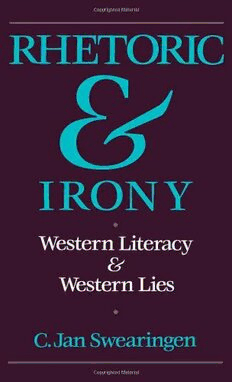
Rhetoric and Irony: Western Literacy and Western Lies PDF
340 Pages·1991·17.255 MB·English
Most books are stored in the elastic cloud where traffic is expensive. For this reason, we have a limit on daily download.
Preview Rhetoric and Irony: Western Literacy and Western Lies
Description:
This pathbreaking study integrates the histories of rhetoric, literacy, and literary aesthetics up to the time of Augustine, focusing on Western concepts of rhetoric as dissembling and of language as deceptive that Swearingen argues have received curiously prominent emphasis in Western aesthetics and language theory. Swearingen reverses the traditional focus on rhetoric as an oral agonistic genre and examines it instead as a paradigm for literate discourse. She proposes that rhetoric and literacy have in the West disseminated the interrelated notions that through learning rhetoric individuals can learn to manipulate language and others; that language is an unreliable, manipulable, and contingent vehicle of thought, meaning, and communication; and that literature is a body of pretty lies and beguiling fictions. In a bold concluding chapter Swearingen aligns her thesis concerning early Western literacy and rhetoric with contemporary critical and rhetorical theory; with feminist studies in language, psychology, and culture; and with studies of literacy in multi- and cross-cultural settings.
See more
The list of books you might like
Most books are stored in the elastic cloud where traffic is expensive. For this reason, we have a limit on daily download.
